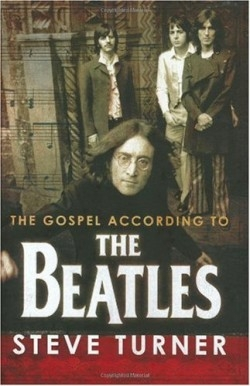The Gospel According to the Beatles
“We’re more popular than Jesus now.” John Lennon’s infamous remark in January of 1966 set off an enormous controversy when it was reported in the United States. In fact, the comment is still repeated as evidence of Lennon’s hubris and godlessness. What prompted the Beatle to say such a thing, and was it really indicative of all the Beatles’ attitudes toward Christianity?
In this book, the author uses Lennon’s remark as the starting point for his analysis of the Beatles’ spiritual and philosophical outlooks. A poet and music journalist in England for more than thirty years, Turner’s previous books include A Man Called Cash the authorized biography of Johnny Cash), and A Hard Day’s Write: The Stories Behind the Songs of the Beatles. Here, he interviews friends and associates of the band members, even uncovering unpublished correspondence and memoirs to obtain clues about the Beatles’ ideas about life and God.
Turner takes eleven chapters, each titled after a Beatles song, to investigate the spiritual principles and life events that informed the music of the Fab Four. He delves into each Beatle’s religious background, including the philosophical influences of their parents and other key family members; examines the foursome’s involvement in Eastern religion, including their short-lived association with the guru Maharishi Mahesh Yogi; and details their use of marijuana and LSD in attempts to reach higher levels of consciousness. Turner even chronicles Lennon’s ill-fated “born-again” phase.
The last, and arguably most interesting, chapter finds Turner reflecting on the Beatles’ influence over his own life, including his personal experience during an interview he once held with Lennon and Yoko Ono. Turner’s own Christian faith is evident as he frankly assesses the conversation: “Looking back I feel embarrassed at some of the things I said,” writes Turner. “He’d been an argumentative nonbeliever for probably fifteen years. I’d been a believer for less than three years. We were unequally matched.”
Ultimately, of course, Lennon remained unconvinced. “Why should I follow Jesus?” Turner quotes him as saying. “I’ll follow Yoko. I’ll follow myself.”
Far from trying to exalt the Beatles as saints while shoehorning their views into a Christian framework, or attempting to demonize them while denouncing their unorthodox ways, Turner discusses their ideas honestly and, for the most part, objectively. He views their search for transcendence with sympathy, believing it to be an experience common to all humans.
A collection of black-and-white photographs helps put the reader “on the scene,” while an epilogue summarizes what happened to several of the minor characters in the story. The book is mainly written for Beatles fans, as Turner leaves out otherwise significant biographical information such as the Beatles’ marriages and the births of their children. However, the author’s investigation is still accessible to neophytes, and any reader will find his narrative engaging, his conclusions illuminating, and his humility winning.
Disclosure: This article is not an endorsement, but a review. The publisher of this book provided free copies of the book to have their book reviewed by a professional reviewer. No fee was paid by the publisher for this review. Foreword Reviews only recommends books that we love. Foreword Magazine, Inc. is disclosing this in accordance with the Federal Trade Commission’s 16 CFR, Part 255.

